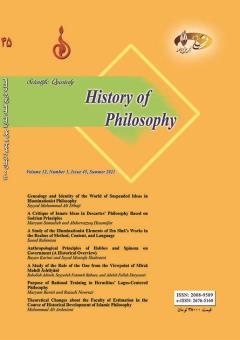-
-
List of Articles
-
Open Access Article
1 - ٍٍٍEditor's Note
Hossein Kalbasi Ashtari -
Open Access Article
2 - Genealogy and Identity of the World of Suspended Ideas in Illuminationist Philosophy
Seyyed Mohammadali Dibaji -
Open Access Article
3 - A Critique of Innate Ideas in Descartes’ Philosophy Based on Sadrian Principles
Maryam Samadieh عبدالرزاق حسامی فر -
Open Access Article
4 - A Study of the Illuminationist Elements of Ibn Sīnā’s Works in the Realms of Method, Content, and Language
Saeed Rahimian -
Open Access Article
5 - Anthropological Principles of Hobbes and Spinoza on Government (A Historical Overview)
Bayan Karimy Seyyed Mustafa Shahraeini -
Open Access Article
6 - A Study of the Rule of the One from the Viewpoint of Mīrzā Mahdī Āshtīyānī
Rohollah Adineh Fatemeh Babaeiy Adeleh Fallah -
Open Access Article
7 - Purpose of Rational Training in Heraclitus’ Logos-Centered Philosophy
Maryam Barati Rezaali Norozy -
Open Access Article
8 - Theoretical Changes about the Faculty of Estimation in the Course of Historical Development of Islamic Philosophy
Mohammad-Ali Ardestani
-
The rights to this website are owned by the Raimag Press Management System.
Copyright © 2017-2026







